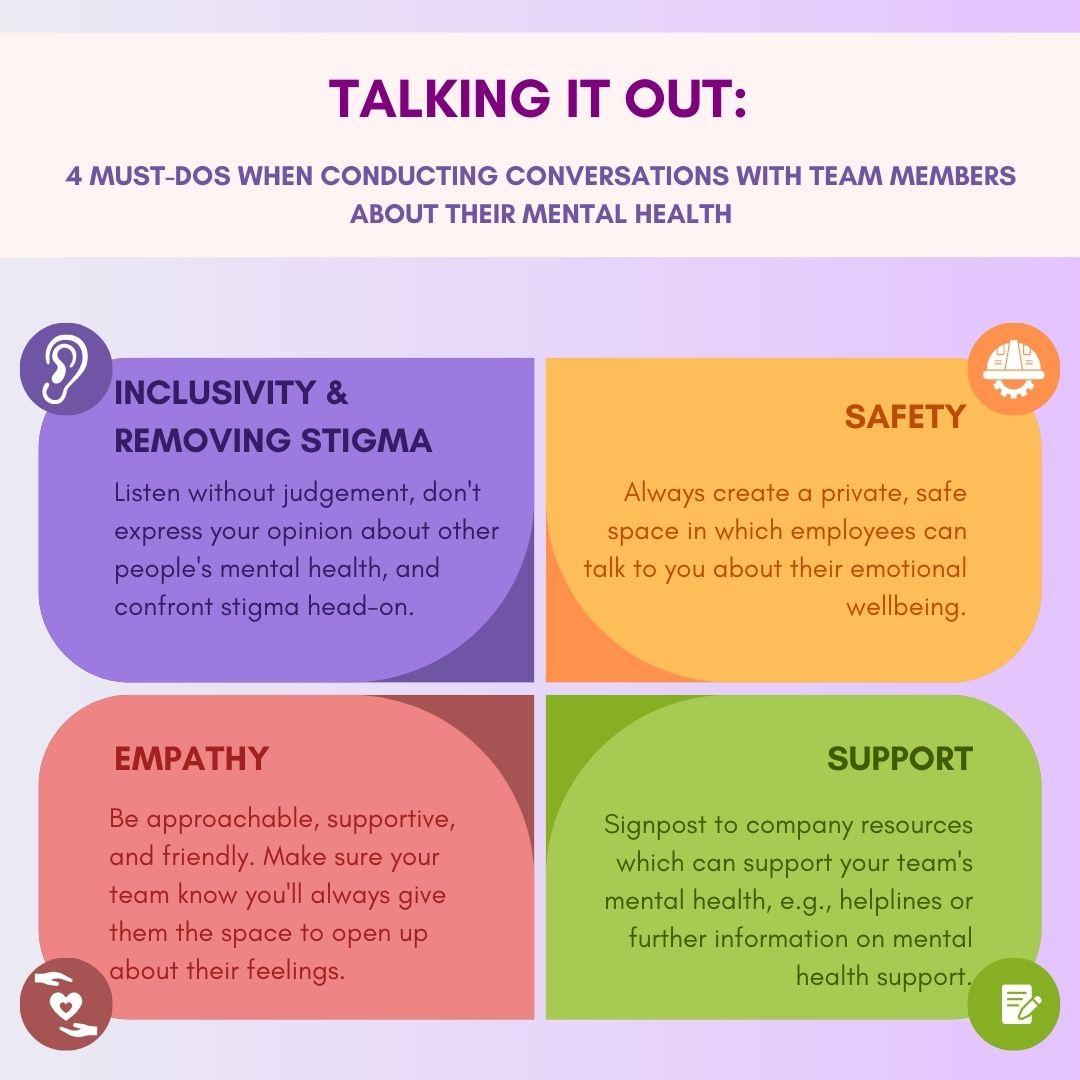In this fifth instalment of our line management blog post series, we’re providing line managers with valuable tips and resources for supporting their team’s mental health and emotional wellbeing.
Let’s picture this: one of your team comes into work feeling tired and unmotivated. They struggle to focus, make mistakes, and end up missing out on an important deadline. Instead of adopting a compassionate approach, their line manager expresses their disappointment with their performance, verbalising their frustration within earshot of the rest of the team. The employee feels put down, quickly spiralling into a vicious circle of demotivation and negativity, further deteriorating their performance and triggering feelings of stress and anxiety. They start calling in sick on days when they feel like they just can’t handle the pressures of work – this quickly turns into long-term sick leave.
But wait – there’s an opportunity to reverse the outcome of this situation, and it all hinges on the reaction of the line manager. What if they had responded differently towards their team member’s mistake?
You’re reading a blog post from our Line Management series
Below are links to all the posts in this series:
In situations like these, the line manager’s approach towards mental health management couldn’t be more critical: with a little sensitivity, encouragement, and empathy from a supportive line manager, the struggling employee will be much more likely to find the courage to open up, safe in the knowledge that their manager will support them and be there to help them with whatever issue they’re facing. This can help them get on the right pathway to getting the support they need, improving their emotional wellbeing and creating a happier, more supportive working environment for everyone.
These two very different outcomes reveal how line managers play such a crucial part in affecting employee mental health. Responsible for administering tasks, organising workloads, and overseeing team progress on a daily basis, line managers often have the most direct and frequent contact with members of their team. As their supervisors, this means their proximity to their organisation’s employees makes them responsible not only for their performance but also for their health, safety, and overall wellbeing in the workplace.
This level of responsibility might sound daunting, but given the right resources and frameworks, positive and effective mental health management can easily be achieved in the workplace.
We all experience both personal and professional pressures that can manifest in feelings of stress, anxiety, and depression. That’s why it’s so important for line managers to take the most progressive and compassionate approach possible when creating strategies to support their team members’ mental health. This means taking the time to have open and honest conversations with their employees about their emotional wellbeing. At Thrive4Life, we suggest that line managers should have these 4 Key Standards in mind when conducting conversations with team members about their mental health:
- Safety: Any discussions about an employee’s mental health struggles should be confidential. Line managers should schedule 1:1 slots with employees to ensure they have privacy and a safe space in which they can feel comfortable talking about their emotional wellbeing.
- Inclusivity & Removing Stigma: Unfortunately, a stigma still clouds discussion surrounding many mental health issues and experiences of mental illness. Line managers should confront and proactively remove any biases they or other team members may have regarding mental illness in order to ensure that all employees are treated fairly. This means listening without judgement and refraining from expressing their opinions about others’ mental health.
- Empathy: Demonstrating empathy is vital to any conversation about mental health. Line managers must strive to be as approachable and friendly as possible to show that they truly care about what their team member is telling them. To do this, they can give them verbal affirmations and allow them to steer the conversation. Line managers should never adopt a confrontational line of questioning or make assumptions about their team members’ mental wellbeing.
- Support: Line managers should facilitate conversations with members of their team about their mental health by signposting them to resources for support and further guidance. This can involve having informational pamphlets and the contact details of mental health professionals to hand.
To understand mental health issues, it is necessary to first acknowledge and recognise them. Conversations are key to any successful strategy for managing mental health in the workplace. By following these suggestions, line managers can better structure their conversations, making them as honest, supportive, and open as possible.
Remember, supporting employee mental health is an employer’s ethical and legal responsibility. Under the 2010 Equality Act, employees facing poor mental health can be considered disabled in the eyes of the law. Employers are legally mandated to make provisions for any disabled employees and must not discriminate against them in any way.

Navigating Stress, Anxiety, and Depression in the Workplace: Understanding Risk Factors and Identifying Symptoms
Serious and debilitating mental problems such as stress, anxiety, and depression can be triggered by toxic working environments. The World Health Organisation highlights negative work environments as a significant contributing factor regarding an individual’s development of mental health issues, with pressures on employee performance and output leading to absenteeism, lost productivity, and even increased substance use as a coping mechanism.
Before developing their mental health strategies, line managers need to understand the risk factors associated with toxic and unhealthy work cultures. To help, we’ve identified some common management risk factors that can significantly impact employee mental health:
- Mismanaged Workloads: If line managers overburden employees with unrealistic workloads, it can make team members feel stressed or anxious about pending tasks and goals which feel impossible to meet. It’s essential to make sure that no one feels like their assigned tasks or responsibilities are too huge for them to control.
- Lack of Support: If management is unsupportive or distant, employees can start to feel isolated in the workplace. If they feel that their line manager is indifferent to their emotions or struggles, feelings of isolation can also begin to be accompanied by a sense of helplessness or reduced confidence in the office.
- Poor Work-Life Balance: We all have personal lives and commitments outside of our working schedules, and line managers must remember this. Long working hours can interfere with team members’ personal lives and prevent them from relaxing and spending time with their loved ones after work. If they’re given the space to enjoy their leisure time outside of work, they’ll return feeling recharged and more productive, benefitting the organisation’s overall output.
- Job Insecurity: A lack of opportunities for career advancement or a fear of being replaced/made redundant can compound workplace pressures, distracting employees from their job and making them less productive. It’s important that team members feel secure and valued in their jobs.
- Bullying and Harassment: If line managers let inappropriate behaviour slide and do not take strict measures against bullying and harassment, employees can feel physically and emotionally vulnerable. This means it couldn’t be more important to stamp out any disrespectful behaviour as soon as it occurs for the good of everyone’s wellbeing.
In addition to these risk factors, line managers should actively look out for signs of stress and depression so that they may get their employees help if needed. Some common symptoms of workplace stress and depression are:
- Increased anxiety levels.
- Complacency with work-related tasks.
- The inability to concentrate or pay attention in meetings and discussions.
- Excessive errors in tasks.
- The inability to make decisions.
- Withdrawing from conversations and becoming isolated from colleagues.
- Changes in physical appearance, i.e. increase or decrease in weight.
- Increased absences.
(Note: These symptoms have been highlighted following the guidelines from psychiatric Dr Rashmi Parmar in her Healthline report.)
Developing Mental Health Strategies: Important Resources for Your Wellbeing Plans
According to Champion Health’s 2023 Workplace Health Report, 56% of employees across a representative sample of 4000 people in diverse trades and organisations are currently experiencing symptoms of work-related stress and depression. Consequently, mental-health-related absenteeism costs UK businesses a yearly average of around 9 billion pounds. The report also highlighted that only 10% of employees from the sample were currently seeking mental health support, meaning many were suffering without the support they needed.
These findings illustrate a crucial lesson for businesses: supporting employees’ mental health has never been more important – it should be a top investment for any and every company.
The most effective way to invest in employee mental health management is to empower line managers with the resources and training needed for them to create positive work environments where employees feel mentally stable and well.
Thrive4Life’s Top Six Strategies for Mental Health Management:
1. Facilitating Access to Counselling: Line managers should encourage employees to seek help for their mental health struggles. To help them do so, they should direct them to professional resources such as licensed therapists and counsellors. Line managers should also be ready to offer flexible working arrangements (e.g., reduced hours or remote work options) to further accommodate employees who need to attend mental-health-related After recommending professional resources, they should also follow up with their employees, offering additional support with workload management and lending an empathetic, non-judgemental ear to any concerns or worries.
2. Mental Health First Aid Course: Thrive4Life’s Mental Health First Aid Course enables line managers to become MHFA England-accredited Mental Health First Aiders. During this course, line managers will be taught how to recognise signs of poor mental health and approach team members in crisis. They’ll become qualified first-line support for employees experiencing mental health problems.
3. Mental Health Skills Development: The practical skills and knowledge line managers may gain as Mental Health First Aiders can be advanced by signing up for one of Thrive4Life’s Mental Health Skills Development workshops. These workshops help line managers refresh their learnings from their Mental Health First Aider qualification and seek further advice from qualified mental health instructors.
4. Activity Plans: Activities that promote mindfulness and meditation can help employees release tension and de-stress. At Thrive4Life, we offer an Introduction to Mindfulness and Meditation course. With the help of our experienced meditation coaches, this course can help line managers better guide their teams, cultivating positive thinking habits and enhancing employees’ productivity and focus while at work.
5. Signposting Helplines: Line managers should regularly signpost mental health helplines for employees facing mental health emergencies. This could mean putting up posters or flyers with the contact details of crisis helplines like Samaritans and Shout or sending out this information in regularly scheduled emails.
6. Animal-Assisted Therapy: Animal-assisted therapy, or pet therapy, helps alleviate mental health stressors by relying on a human-animal bond to help people relax and improve their mood. To benefit from the proven benefits of this kind of therapy, line managers could book sessions to have animals (e.g., puppies!) come in and play with their employees. This can alleviate work stress by giving employees a break from their workload and a chance to relax and have fun doing something entirely different to their day-to-day tasks.
With these resources, line managers can build holistic and effective mental health strategies that support their team members’ mental health.

In Summary
As we navigate the challenges and pressures of the modern workplace, caring for employees’ mental health must be at the forefront of all management policies. As highlighted in this blog post, line managers not only play a crucial role in creating a positive work environment but have the most immediate impact on employee wellbeing. By encouraging open conversations about mental health, creating safe and supportive spaces for their team, and providing access to professional resources, line managers can help normalise and de-stigmatise mental health struggles in the workplace.
After all, seeking help is a sign of strength – line managers should empower their team members to reach out when needed, helping them to feel the happiest, healthiest, and most productive versions of themselves.
References
Supporting Mental Health at Work. Acas: Working for Everyone.
https://www.acas.org.uk/supporting-mental-health-workplace
Mental Health and Substance Use. [2022]. World Health Organisation.
Work Depression: How To Take Care of Your Mental Health On the Job. [2021]. Healthline.
https://www.healthline.com/health/depression/work-depression#definition
Depression Statistics UK. [2023]. Champion Health.
https://championhealth.co.uk/insights/depression-statistics/#2
Mental Health First Aider Course. Thrive4Life.
https://www.thrive4life.co.uk/health-wellbeing-training/mental-health-first-aider-course/
Mental Health Skills Development.Thrive4Life.
Mindfulness and Meditation. Thrive4Life.
https://www.thrive4life.co.uk/wellbeing-activities-and initiatives/mindfulness-and-meditation/
Animal-Assisted Therapy: What To Know. [2020] Medical News Today.
https://www.medicalnewstoday.com/articles/animal-therapy#how-it-works
Please note, these are external links away from the Thrive4Life website. We are not responsible for the content of external websites.










